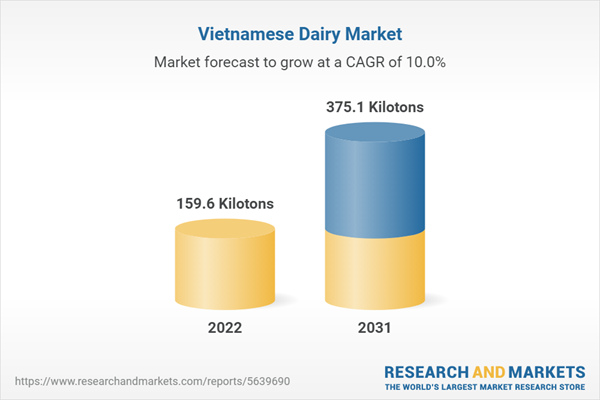Vietnam's dairy industry revenues nearly doubled from USD 4.4 billion in 2017 to USD8.4 billion in 2021, with less than half of the demand met by domestic production. The value of dairy products imported into Vietnam in 2021 was USD 11.8 billion, an increased 12.4% YOY.
According to the analyst's analysis, there are more than 200 dairy producers in Vietnam by the end of 2021. The dairy market in Vietnam is mainly dominated by major players such as Vinamilk, Nestle Vietnam, Nutifood, Frieslandcampina and TH Group. The number of cows in Vietnam will increase from 330,000 in 2019 to 700,000 in 2030.
Vietnam's fresh milk production reached 1.2 billion liters in 2021 and will rise to 2 billion liters by 2030. Despite the rise in production, domestic fresh milk production can only meet 40-50% of domestic demand, with the rest relying mainly on imports.
In addition to relying on imported fresh milk, Vietnam also imports cows, animal nutrition products and production materials of animal feed. To remain competitive, local companies are looking for quality management and food safety solutions, while larger companies are investing in Industrial 4.0 technologies and R&D.
Milk consumption per capita in Vietnam was only 28 liters in 2021, lower than Thailand (35 liters) and Singapore (45 liters), with huge potential for growth. The analyst expects milk consumption per capita in Vietnam to reach 40 liters by 2030. Consumption is gradually increasing, driven by a large, young and fast-growing population (around 100 million people) and the rising purchasing power of the country's middle class.
Dairy companies are also seeing increasing opportunities to serve Vietnam's elderly population (65+), which is expected to reach 14% in 2040, up from 7% in 2020.
In addition, Vietnam's dairy exports are growing rapidly. Vietnam's dairy export value exceeds USD300 million. Vietnam’s dairy products are exported to more than 40 countries. According to this analysis, China has granted transaction codes to eight Vietnam’s dairy companies (20 factories), allowing them to export their products to China.
In terms of product segmentation, milk powder and liquid milk total nearly three-quarters of Vietnam's dairy market size. Most of the milk powder imported into Vietnam is processed into remade milk. Among liquid milk, the preferred form is UHT milk because of its longer shelf life, especially in rural areas where cold chain facilities are not well developed.
According to this analysis, the fastest growing segment of Vietnam's dairy market in terms of sales volume in 2021 is milk powder, with production volume reaching about 152,000 tons, up about 13% year-on-year, followed by yogurt, liquid milk, etc.
According to this analysis, the demand for cheese and butter is rising rapidly due to the growing influence of Western food in Vietnam, especially among the younger generation in urban areas.
The analyst said the demand for dairy products to rise in Vietnam’s market from 2022-2031, with more market opportunities for investors. Organic dairy products, natural fresh milk products, and dairy-containing health food products in Vietnam are expected to maintain a fast growth rate in the coming years.
Topics covered:
- Overview of Vietnam's Dairy Industry
- Economic and Policy Environment of Vietnam’s Dairy Industry
- What is the impact of COVID-19 on Vietnam’s dairy industry?
- Vietnam’s Dairy Market Size, 2016-2021
- Forecast on Vietnam’s Dairy Market, 2022-2031
- Import and Export Analysis of Dairy Products in Vietnam
- Analysis of Major Dairy Companies in Vietnam
- Key drivers and Market Opportunities in Vietnam’s Dairy Industry
- What are the key drivers, challenges and opportunities for Vietnam’s dairy industry during 2022-2031?
- What is the expected revenue of Vietnam’s dairy industry during 2022-2031?
- Which segment of Vietnam’s dairy industry market is expected to dominate the market in 2031?
- What are the major adverse factors facing Vietnam’s dairy industry?
Table of Contents
Companies Mentioned
- Vinamilk
- FrieslandCampina Vietnam Co., Ltd.
- Nutifood Nutrition Food Joint Stock Company
- TH True Milk
- Abbott
- Nestle Vietnam
- Vinasoy
Methodology
Background research defines the range of products and industries, which proposes the key points of the research. Proper classification will help clients understand the industry and products in the report.
Secondhand material research is a necessary way to push the project into fast progress. The analyst always chooses the data source carefully. Most secondhand data they quote is sourced from an authority in a specific industry or public data source from governments, industrial associations, etc. For some new or niche fields, they also "double-check" data sources and logics before they show them to clients.
Primary research is the key to solve questions, which largely influence the research outputs. The analyst may use methods like mathematics, logical reasoning, scenario thinking, to confirm key data and make the data credible.
The data model is an important analysis method. Calculating through data models with different factors weights can guarantee the outputs objective.
The analyst optimizes the following methods and steps in executing research projects and also forms many special information gathering and processing methods.
1. Analyze the life cycle of the industry to understand the development phase and space.
2. Grasp the key indexes evaluating the market to position clients in the market and formulate development plans
3. Economic, political, social and cultural factors
4. Competitors like a mirror that reflects the overall market and also market differences.
5. Inside and outside the industry, upstream and downstream of the industry chain, show inner competitions
6. Proper estimation of the future is good guidance for strategic planning.

LOADING...
Table Information
| Report Attribute | Details |
|---|---|
| No. of Pages | 60 |
| Published | July 2022 |
| Forecast Period | 2022 - 2031 |
| Estimated Market Value in 2022 | 159.6 Kilotons |
| Forecasted Market Value by 2031 | 375.1 Kilotons |
| Compound Annual Growth Rate | 9.9% |
| Regions Covered | Vietnam |
| No. of Companies Mentioned | 7 |









